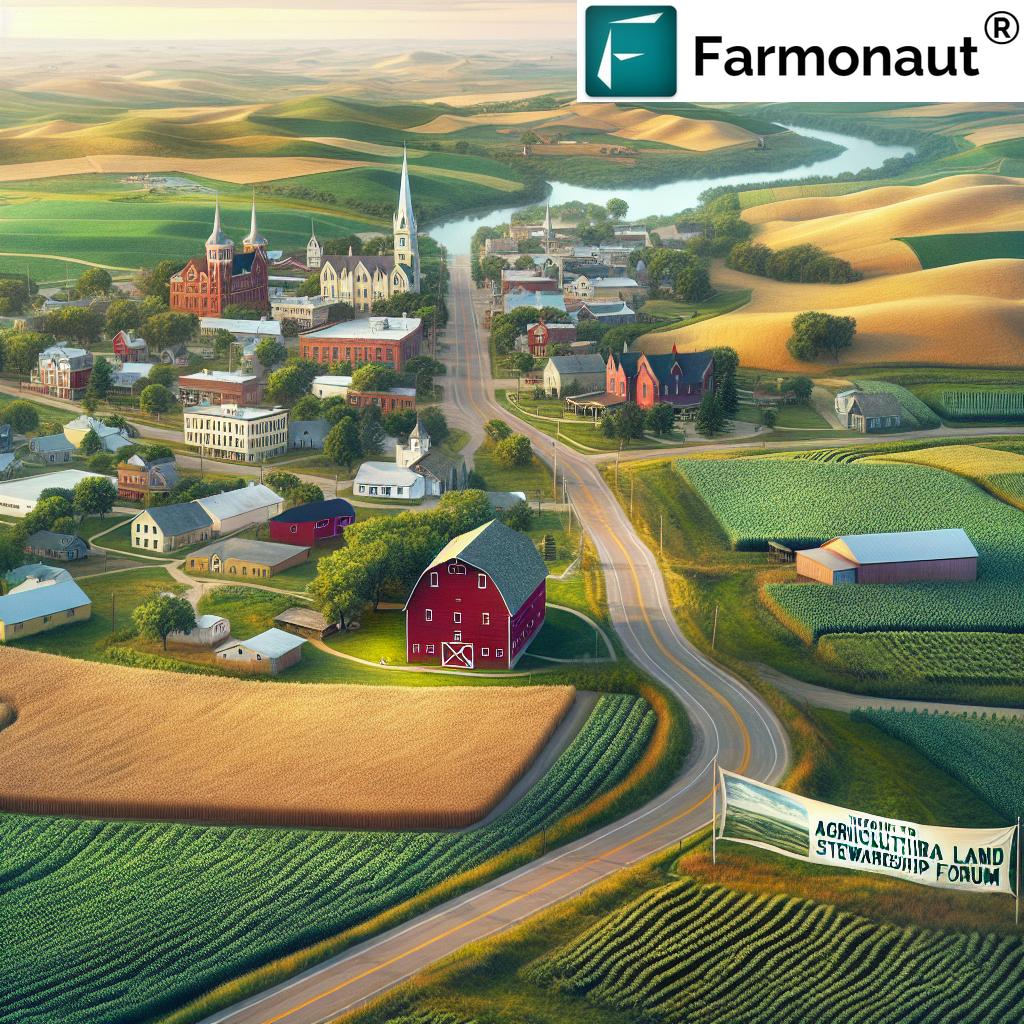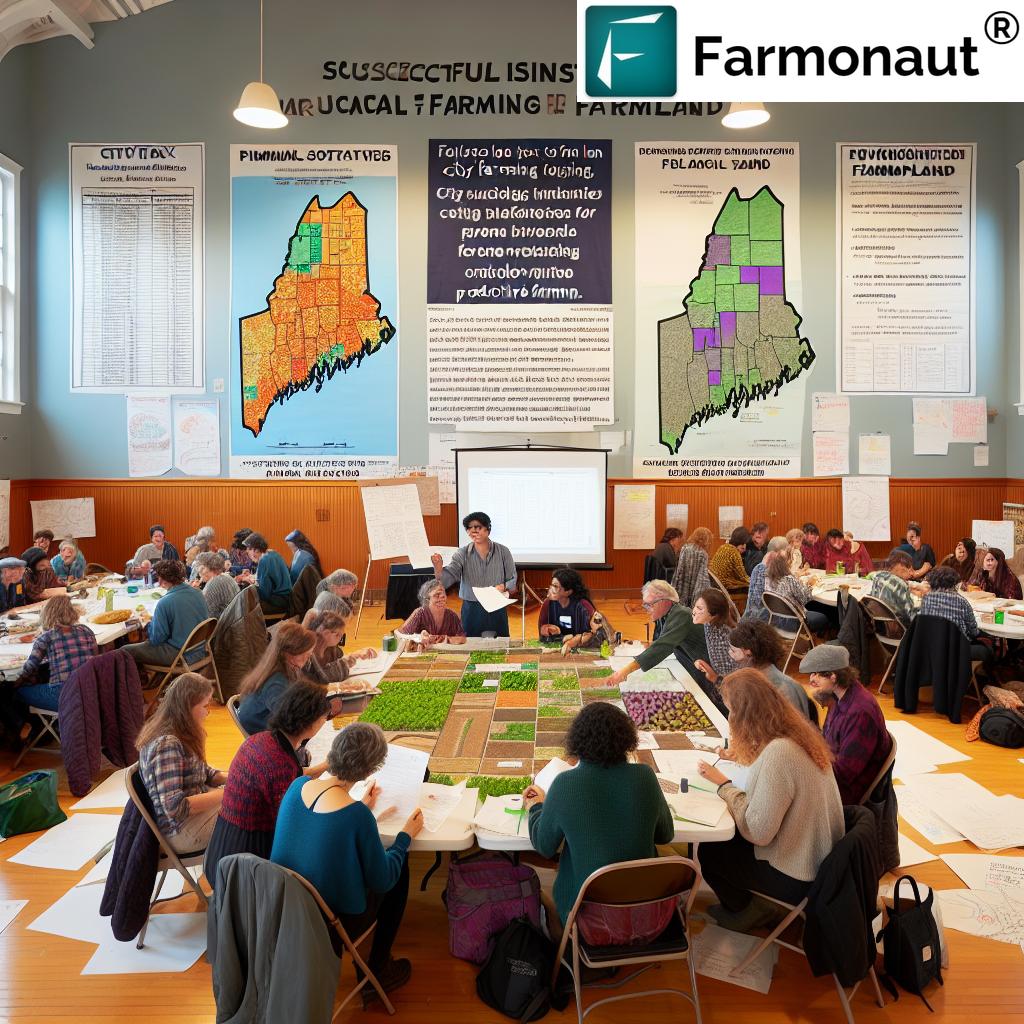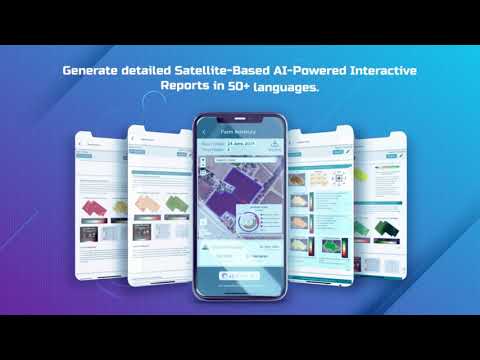Advancing Farm-Friendly Policies: Farmington, Maine Hosts Community Forum on Agricultural Land Stewardship and Rural Economic Development
“Maine’s Greater Farmington area hosts a forum uniting farmers, municipal representatives, and land stewards from multiple communities.”
As advocates for sustainable agriculture and rural development, we are excited to share news of an upcoming community forum that promises to shape the future of farmland conservation in Maine. On April 3, 2025, the picturesque town of Farmington will become the epicenter of a crucial conversation on agricultural land stewardship and rural economic development. This event, organized by Maine Farmland Trust and the Greater Franklin Food Council, brings together a diverse group of stakeholders to explore innovative municipal policies for agriculture and farm-friendly community strategies.
In this comprehensive blog post, we’ll delve into the details of this important gathering, discuss the key issues at stake, and explore how events like these are vital for advancing sustainable farming practices and preserving our precious agricultural lands. Let’s embark on this journey to understand how Farmington, Maine, is taking center stage in the ongoing effort to support local food production and strengthen rural economies.
The Importance of Farmland Conservation in Maine
Before we dive into the specifics of the upcoming forum, it’s crucial to understand why farmland conservation in Maine is such a pressing issue. As a state with a rich agricultural heritage, Maine faces unique challenges in preserving its working lands while adapting to modern economic pressures.
- Preserving rural character and open spaces
- Ensuring food security through local production
- Supporting rural economies and livelihoods
- Protecting wildlife habitats and ecosystem services
- Maintaining cultural traditions tied to farming
These factors underscore the importance of events like the Farmington forum, which aim to bring together diverse stakeholders to craft solutions that balance conservation with economic viability.

The Farmington Forum: A Collaborative Approach to Agricultural Policy
The upcoming community conversation in Farmington represents a significant step forward in addressing the challenges facing Maine’s agricultural sector. By bringing together farmers, municipal representatives, regional organizations, and agricultural land stewards from seven towns in the Greater Farmington area, this forum creates a unique opportunity for collaboration and knowledge sharing.
“The agricultural forum in Farmington, Maine will explore at least 3 key strategies: tax incentives, zoning, and sustainable practices.”
Key aspects of the forum include:
- Networking opportunities for farmers and municipal leaders
- Peer-to-peer learning among municipalities on effective tools and strategies
- Collaborative identification of local and regional municipal policies supporting agriculture
- Discussions on working lands conservation, property tax incentives, and zoning for agricultural land use
This event underscores the importance of community agriculture forums in fostering dialogue and driving policy change. By creating a space for direct collaboration between food producers and town leaders, the forum aims to strengthen agriculture as a critical sector of the Farmington region’s economy.
Exploring Municipal Policies for Agriculture
One of the primary focuses of the Farmington forum will be the exploration of municipal policies that can support and enhance the local agricultural community. These policies play a crucial role in creating an environment where farms can thrive and contribute to the rural economy. Let’s examine some of the key policy areas that will likely be discussed:
Property Tax Incentives for Farms
Property tax incentives can be a powerful tool for supporting farmers and preserving agricultural land. These incentives can take various forms, such as:
- Current use valuation for farmland
- Tax abatements for conservation easements
- Exemptions for farm buildings and equipment
By reducing the tax burden on agricultural properties, municipalities can help ensure that farming remains economically viable and that productive lands are not lost to development.
Zoning for Agricultural Land Use
Effective zoning policies are essential for protecting farmland and supporting agricultural activities. Some zoning strategies that may be explored include:
- Agricultural protection zoning
- Cluster development to preserve open space
- Allowances for agritourism and value-added activities
These zoning approaches can help maintain the rural character of communities while providing farmers with the flexibility to diversify their operations and increase profitability.
Sustainable Farming Practices
Encouraging and supporting sustainable farming practices is crucial for long-term agricultural viability and environmental stewardship. Municipal policies can promote sustainability through:
- Incentives for adopting conservation practices
- Support for organic and regenerative farming methods
- Programs to enhance soil health and water quality
By fostering sustainable practices, municipalities can help ensure that farming remains productive and environmentally sound for generations to come.
The Role of Technology in Modern Farmland Conservation
As we discuss farmland conservation and agricultural policy, it’s important to recognize the role that modern technology plays in supporting these efforts. Innovative tools and platforms are enabling farmers, policymakers, and conservationists to make more informed decisions about land use and management.
One such technology that’s making waves in the agricultural sector is satellite-based farm management. Companies like Farmonaut are at the forefront of this revolution, offering advanced solutions that can significantly impact how we approach farmland conservation and sustainable agriculture.
Farmonaut’s platform provides valuable services such as real-time crop health monitoring, AI-based advisory systems, and resource management tools. These technologies can help farmers optimize their practices, reduce resource waste, and improve overall productivity – all of which contribute to the long-term viability of agricultural lands.
For example, Farmonaut’s satellite-based crop health monitoring can help farmers identify issues early, potentially reducing the need for chemical interventions and promoting more sustainable farming practices. This aligns perfectly with the goals of farmland conservation and sustainable agriculture that will be discussed at the Farmington forum.
To learn more about how satellite technology is transforming land use in agriculture, you can explore Farmonaut’s crop plantation and forest advisory services. These innovative tools can provide valuable insights for both individual farmers and policymakers looking to support sustainable agricultural practices.
Community-Driven Solutions for Rural Economic Development
The Farmington forum isn’t just about preserving farmland – it’s also focused on fostering rural economic development. By bringing together diverse stakeholders, the event aims to generate community-driven solutions that can help agricultural communities thrive economically while maintaining their rural character.
Some potential areas of focus for rural economic development include:
- Supporting local food systems and farm-to-table initiatives
- Developing agritourism opportunities
- Encouraging value-added agricultural products
- Improving infrastructure to support agricultural businesses
- Creating workforce development programs for agricultural careers
These strategies can help create a more resilient and diverse rural economy, ensuring that farming remains a viable and attractive career option for future generations.

The Importance of Agricultural Land Stewardship
A key theme of the Farmington forum is agricultural land stewardship – the responsible management and conservation of farmland for current and future generations. This concept goes beyond simply preserving land; it encompasses a holistic approach to land management that considers environmental, economic, and social factors.
Effective agricultural land stewardship involves:
- Implementing soil conservation practices
- Protecting water resources
- Preserving biodiversity and wildlife habitats
- Adopting climate-smart agricultural techniques
- Maintaining the cultural and historical value of agricultural lands
By focusing on these aspects of stewardship, communities can ensure that their agricultural lands remain productive, environmentally sound, and culturally significant for years to come.
Innovative Approaches to Local Food Production Support
Supporting local food production is a crucial aspect of farmland conservation and rural economic development. The Farmington forum will likely explore various innovative approaches to bolstering local food systems, including:
- Community Supported Agriculture (CSA) programs
- Farm-to-school initiatives
- Local food hubs and distribution networks
- Farmers’ markets and direct-to-consumer sales
- Food processing facilities for value-added products
These strategies can help create a more robust local food economy, providing farmers with reliable markets and consumers with access to fresh, locally-grown produce.
In this context, technology can play a significant role in supporting local food production. For instance, Farmonaut’s large-scale farm management solutions can help farmers optimize their operations, potentially increasing yields and improving the efficiency of local food production.
Farmland Conservation Strategies in Greater Farmington, Maine
| Strategy Type | Description | Potential Benefits |
|---|---|---|
| Property Tax Incentives | Reduced property taxes for active farmland and conservation easements | Encourages land preservation, reduces financial burden on farmers |
| Agricultural Zoning | Specific zoning regulations to protect farmland from development | Preserves rural character, maintains agricultural land base |
| Sustainable Farming Practices | Promotion of conservation tillage, crop rotation, and organic methods | Improves soil health, reduces environmental impact, enhances long-term productivity |
| Community-Supported Agriculture Programs | Direct partnerships between farmers and consumers | Provides stable income for farmers, strengthens local food systems |
| Farmland Preservation Easements | Legal agreements to maintain land for agricultural use | Ensures long-term preservation of farmland, potential tax benefits for landowners |
The Role of Regional Organizations in Advancing Farm-Friendly Policies
Regional organizations play a crucial role in advancing farm-friendly policies and supporting agricultural communities. The involvement of entities like Maine Farmland Trust and the Greater Franklin Food Council in organizing the Farmington forum highlights the importance of these organizations in facilitating dialogue and driving change.
Some key functions of regional organizations in supporting agriculture include:
- Providing technical assistance to farmers and municipalities
- Conducting research on agricultural trends and best practices
- Advocating for supportive policies at the state and local levels
- Facilitating networking and knowledge sharing among stakeholders
- Implementing conservation programs and initiatives
By leveraging the expertise and resources of these organizations, communities can develop more effective strategies for farmland conservation and rural economic development.
Leveraging Technology for Sustainable Agriculture
As we consider the various strategies for farmland conservation and sustainable agriculture, it’s important to recognize the role that technology can play in supporting these efforts. Advanced tools and platforms can provide farmers and policymakers with valuable insights and capabilities to make more informed decisions about land use and management.
For instance, Farmonaut’s innovative solutions offer a range of benefits that align with the goals of farmland conservation and sustainable agriculture:
- Precision Agriculture: By using satellite imagery and AI-driven insights, farmers can optimize resource use, reducing waste and environmental impact.
- Crop Health Monitoring: Real-time monitoring allows for early detection of issues, potentially reducing the need for chemical interventions.
- Weather Forecasting: Accurate weather predictions help farmers make informed decisions about planting, irrigation, and harvesting.
- Yield Prediction: Advanced analytics can help farmers and policymakers better understand productivity trends and plan accordingly.
These technological capabilities can complement the policy initiatives and community-driven strategies discussed at forums like the one in Farmington. By integrating these tools into their operations, farmers can enhance their stewardship of the land while improving productivity and profitability.
For more information on how technology can support sustainable farming practices, explore Farmonaut’s crop loan and insurance solutions, which leverage satellite data to improve access to financing for farmers.
The Future of Farmland Conservation in Maine
As we look to the future of farmland conservation in Maine, events like the Farmington forum play a crucial role in shaping the path forward. By bringing together diverse stakeholders and fostering collaborative discussions, these gatherings can generate innovative solutions to the challenges facing agricultural communities.
Some key areas that will likely shape the future of farmland conservation in Maine include:
- Adaptation to climate change and extreme weather events
- Integration of technology in farming practices
- Development of new markets for local and specialty crops
- Succession planning and support for new and young farmers
- Balancing conservation with economic development
By addressing these issues proactively and collaboratively, Maine’s agricultural communities can work towards a future where farming remains viable, sustainable, and integral to the state’s economy and culture.
Conclusion: A Collaborative Approach to Agricultural Stewardship
The upcoming community forum in Farmington, Maine, represents a significant step forward in addressing the complex challenges facing agricultural communities. By bringing together farmers, municipal leaders, and land stewards, this event creates a unique opportunity for collaboration, knowledge sharing, and policy development.
As we’ve explored in this blog post, the issues surrounding farmland conservation, sustainable agriculture, and rural economic development are multifaceted and interconnected. Addressing these challenges requires a holistic approach that considers environmental, economic, and social factors.
The strategies and policies discussed at the Farmington forum – from property tax incentives to zoning regulations and sustainable farming practices – have the potential to shape the future of agriculture in Maine. By combining these policy initiatives with innovative technologies and community-driven solutions, we can work towards a future where farming remains viable, sustainable, and integral to the state’s economy and culture.
As we look forward to the outcomes of this important gathering, we’re reminded of the power of community engagement and collaborative problem-solving. It’s through events like these that we can forge a path towards a more sustainable and prosperous future for Maine’s agricultural lands and the communities that depend on them.
FAQ Section
Q: What is the main purpose of the Farmington community forum?
A: The forum aims to bring together farmers, municipal representatives, and agricultural land stewards to discuss and advance farm-friendly municipal policies in the Greater Farmington region.
Q: Who is organizing the event?
A: The forum is being organized by Maine Farmland Trust and the Greater Franklin Food Council.
Q: When and where will the forum take place?
A: The event will be held on April 3, 2025, from 12:45-3 PM at the University of Maine at Farmington, North Dining Hall, 111 South Street, Farmington.
Q: What topics will be discussed at the forum?
A: The forum will cover topics such as working lands conservation, property tax incentives, zoning, land use and access, and other municipal policies that support the agricultural community.
Q: Who can attend the forum?
A: The forum is open to farmers, municipal representatives, regional organizations, and agricultural land stewards from the towns of Farmington, Jay, Livermore, Livermore Falls, New Sharon, Starks, and Wilton.
Q: Is there a cost to attend the forum?
A: The event is free to attend, but registration is required.
Q: How can I register for the forum?
A: You can register online or by calling Krista Chappell at the Maine Farmland Trust office: 207-338-6575.
Q: Will there be follow-up support after the forum?
A: Yes, Maine Farmland Trust will be available to offer municipalities technical assistance to plan and implement policies that support identified needs following the forum.
Explore Farmonaut’s Solutions for Sustainable Agriculture
As we’ve discussed the importance of technology in supporting sustainable agriculture and farmland conservation, we invite you to explore Farmonaut’s innovative solutions. Our platform offers a range of tools designed to help farmers optimize their operations, improve productivity, and enhance their stewardship of the land.
Earn With Farmonaut: Affiliate Program
Earn 20% recurring commission with Farmonaut’s affiliate program by sharing your promo code and helping farmers save 10%. Onboard 10 Elite farmers monthly to earn a minimum of $148,000 annually—start now and grow your income!
Ready to transform your farming experience with cutting-edge technology? Explore our apps and services:
For developers interested in integrating our satellite and weather data into their own systems, check out our API and API Developer Docs.
By leveraging Farmonaut’s advanced technologies, farmers and agricultural communities can take significant steps towards more sustainable and productive farming practices, aligning with the goals discussed at forums like the one in Farmington, Maine.







